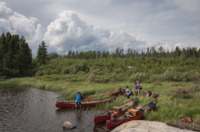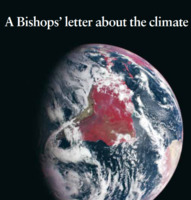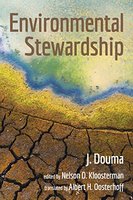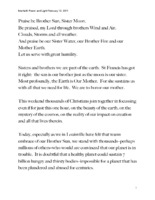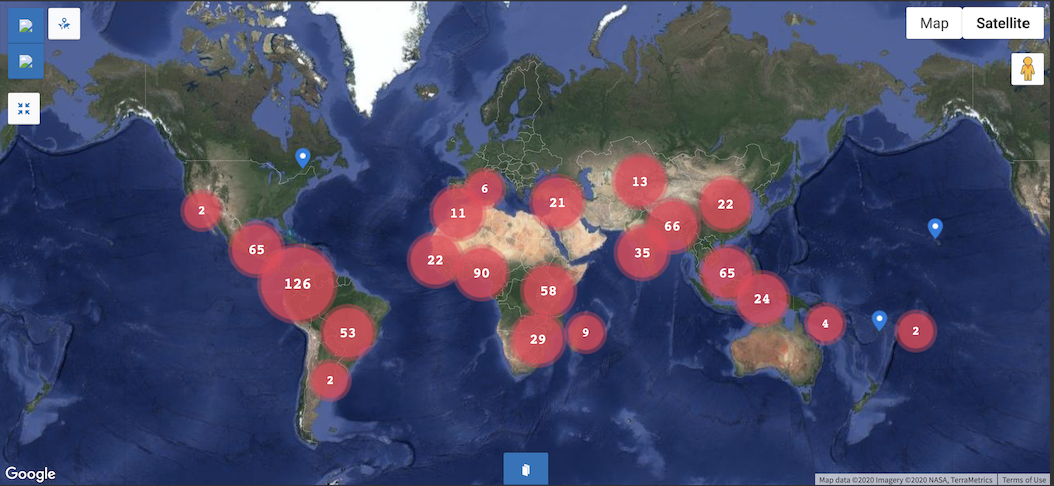Search
109 items
-
Paddling with a purpose
"Paddling with a purpose: The future deserves a sustainable world". Taken by Diego Norena. Submitted to the RESTORExchange Sustainability Photo Contest. -
Extra Time
"Let's recycle our garbage to give our planet extra time". Taken by Mohamed Dhaouadi. Submitted to the RESTORExchange Sustainability Photo Contest. -
God’s Creation Waits
This document is a children's activity book. It discusses topics of different species and environments, showing the importance of each part of our world and connecting it to Christian teachings and values. This includes activities such as crosswords, coloring pages, and much more. -
How Religion Influences Our Relationship With the Environment
The article shows how religious change can effect trends in the environment and how it can produce better environmental conditions attitudes. It lists statistics on which countries have certain environmental issues and how religion may play a role in certain situations. -
Engaged Organizations: General Board of Global Ministries
General Board of Global Ministries discuss their vision and span of their work on their website. Their areas of impact run the gamut for a multitude of environmental and social justice issues:
"Connection is at the core of our work. Global Ministries connects The United Methodist Church, its people and congregations to partner with others engaged in God’s global work, which takes place in a variety of settings, countries and cultures.
Global Ministries works through missionaries and partners in more than 60 countries around the world. " -
Engaged Organizations: A Rocha International
A Rocha International discuss their mission on their website:
"At A Rocha USA, our mission is to restore both people and places through collaborative, community-based conservation.
We resource Christians to care for creation where they live by building a network of hands-on conservation projects in communities across the nation. Through partnerships with individuals, churches, and community groups, we provide content, curriculum, and a network of support for improving local habitats and increasing biodiversity." -
Engaged Organizations: Columban Center for Advocacy and Outreach
Columban Center for Advocacy and Outreach serves as a line of communication between Columban missionaries and policy makers in Washington D.C. Missionaries are stationed in 16 countries around the world, bringing attention to environmental justice issues that are most pressing for marginalized populations in the areas. Their primary focus is combating human-induced climate change. In addition, they advocate for sustainable development and agricultural systems, and right to clean water. -
Engaged Organizations: National Council of Catholic Women
National Council of Catholic Women discuss their work with Catholic Relief Services with regard to their focus on water projects in developing countries, as indicated on their website and in the video below:
"The Water for Life video illustrates the work of Catholic Relief Services in partnership with the National Council of Catholic Women (www.nccw.org) in responding to the critical need for water projects in developing countries. The greatest humanitarian crisis in the world today is food and water scarcity issues that threaten the peace and security of most developing nations." -
Hindu Ecology
Among other philosophical beliefs of Hinduism, adherents advocate for the sacredness of all life forms, simple living, and inner peace. This Hindu statement on ecology, compiled and edited by Ranchor Prime and published by the World Bank in 2003, is posted on the website for Interfaith Center for Sustainable Development: -
Global Climate Change A Plea for Dialogue Prudence and the Common Good
A Statement of the United States Conference of Catholic Bishops was issued on June 15, 2001. This document covers a multitude of current environmental problems and the resulting negative impact on populations around the world - especially with regard to indigent populations. It stressed the connectivity of human behavior and it's impact on the planet. -
Keynote Address by His All-Holiness Ecumenical Patriarch Bartholomew at the Arctic Circle Assembly
Ecumenical Patriarch Bartholomew I of Constantinople addressed the Arctic Circle Assembly in Reykjavik, October 13, 2017. Below is a section of the keynote address, focusing on the impact of climate change with regard to the Arctic Circle:
"Scientists tell us that the Arctic is a vibrant image and vivid mirror of the state of our planet as a whole. For scientists, the Arctic is the barometer of the globe's environmental health. The ecological misdeeds committed in other regions – including chemical contamination and nuclear radiation – are clearly evident in the Arctic environment. Above all, the dramatic rise in global temperatures is having a palpable effect on the Arctic landscape. Nevertheless, so many industrial societies and activities that cause climate change are often blind to the consequences of their behavior. But here, in the Arctic Circle, it is possible to see all manner of things so much more clearly. When we visit this pristine part of the planet, we cannot hide our eyes, either from the beauty of God’s creation or from the changes which human folly has generated. Nor can we avoid pondering the terrible consequences for the remainder – and the future – of the world, if glaciers continue to melt and sea-levels continue to rise." -
A Bishops’ Letter about the Climate
Below is a section of the introduction from A Bishops’ Letter about the Climate, which covers a multitude of critical environmental issues, from the 2014 Bishops' conference:
"We have lived with reports and forecasts of climate change since the 1980s. Our climate is the result of the interaction of complex systems and there is often a great distance between cause and effect in terms of both space and time. There are uncertainties and a lack of clarity. However, the knowledge we possess today does not allow us to postpone until tomorrow
what needs to be done now. Our human climate impact must decrease for the sake of the earth, for the sake of the world that God so loves that God gave us Jesus Christ." -
Our Moral Opportunity on Climate Change
On November 3, 2017, the New York Times posted an article by Justin Welby, the archbishop of Canterbury and primate of the Church of England, discussing some of the devastating weather-related disasters that had occurred at that time and how climate change factored into the tragedies. Below is one section of the article, discussing responses of various faith groups with regard to these events:
"Indeed, even amid the hurricane-caused devastation and despair of recent weeks, I have seen seeds of hope. Different expressions of the Christian faith are freshly united around the need to care for our common home. The Catholic, Anglican and Orthodox Churches just came together with the World Council of Churches to celebrate a month long Season of Creation. During this season, people all around the globe prayed and acted to address climate change and to protect the earth." -
The Hope We Share: A Vision For Copenhagen
The Anglican Communion Environmental Network addressed the United Nations Framework Convention on Climate Change (UNFCCC)
Conference Of Parties (COP) Meetings, the Fifteenth Session, held in Copenhagen, Denmark in December 2009. They lament the consequences of environmental human footprints, some of which include the lack of drinkable water in various parts of the world, the increased difficulty to grow crops due to the water shortages, rampant consumerism, and subsidies for fossil fuels. -
Lutherans Reflect on Climate Change Conference in Copenhagen
This article discusses some of the sentiments regarding proceedings from the 2009 United Nations Climate Change Conference in Copenhagen. While some attendees expressed disappointment in the outcome, others were more optimistic about steps which may lead to more effective action for climate change in the future. The following excerpt provides a brief description of the event:
"More than 3,000 ELCA members, along with a coalition of U.S. faith leaders, sent some 20,000 postcards to President Barack Obama, urging him to be at the meeting, she said. Obama attended the conference and urged leaders of Brazil, China, India and South Africa to join the United States 'to fund developing nations' projects to deal with droughts,
floods and other impacts of climate change, and to develop clean energy,' among other agreements, according to a U.N. news release." -
What Karl Marx has to say about today's environmental problems
Ted Benton, a Professor of Sociology at the University of Essex, writes about how Marx's theories can be applied to modern environmental issues such as climate change. He talks about how Marx's ideas about capitalism relate to current exploitation of nature, and specifically about soil degradation which was an issue during the 1860s when Marx was alive. He also includes problematic parts of Marx's attitudes towards nature, such as his praise of increased productivity of land that may have inspired Stalin. -
Environmental Stewardship
This book goes into detail about how the Christian religion goes about environmental stewardship. They look at how bible passages talk about preserving the Earth and the morals we should have surrounding it. It dives deep into how science interacts with human interaction with the Earth and the damage that we have done to Earth, as well as what we should do to correct ourselves. -
How Buddhist monks in Ladakh are fighting climate change
Buddhists Monks in the Himalayas are taking a stand to climate change. On Earth Day 2018, thousands of people came together in the village of Yerat to plant trees. The region is rapidly losing glaciers, causing a shortage in water supply to the villages in the area who rely on snowmelt for water. The volunteers were inspired to participate due to their devotion to His Holiness Kyabgön Chetsang Rinpoche and his vision for "a more verdant and organic Ladakh." -
Seeing true nature: Buddhism and the environment
John Worthington-Hill describes how Buddhism can encourage environmental awareness and sustainability. Embracing individuality is our disconnection from the natural world. In order to live in unity with the earth, we must find the 'middle way' (a buddhist morality based on self-discipline). "Self-centeredness is the great illness from which all imbalance, insensitivity and abuse ultimately stem – an illness directly linked to the Buddha’s ‘three poisons of greed, ill-will and delusion’. These poisonous mentalities seep into the collective consciousness and are instilled in the norms and structures of culture and society, helping to direct how politics and economics deal with the environment." "Environmental destruction is therefore an outer manifestation of an inner affliction. If our thoughts are polluted, then our actions will be polluted too, and so will their consequences." -
GOP Rep. Mike Simpson: "It’s my party, and I’ll fight climate change if I want to"
An article published on Grist.org that covers Congressman Mike Simpson's views on salmon conservation. Simpson's statements are noteworthy for sustainability and religion as he is going against Republican party views by acknowledging an issue with climate change and the environment with his religious views. It is reported that his speech was obviously fueled by a spiritual obligation to preserve salmon as he describes salmon as incredible God created creatures and that their cycle of life should not be messed with. It is also important to note he was already elected for his 11th term in the house, so it is less likely that his more left leaning statements come from a desire to secure votes. -
Himalayan Institute
Founded in 1969 by the great teacher and humanitarian, Swami Rama, the Himalayan Institute acts on the basis of yoga tradition and Eastern spirituality. Through the living connection to an ancient wisdom tradition of the Himalayan Masters, and the guidance of spiritual head Pandit Rajmani Tigunait, the Himalayan Institute seeks to serve communities across the globe of those who seek to live their spiritual values. The institute provides resources for anyone seeking spiritual wellness such as yoga and meditation training, local retreats and seminars, and domestic and international excursions, frequently taking the form of a trek through the Himalayas. The Himalayan Institute strives for sustainable living in partnership with the community in Honesdale and also in their projects in India and Africa- providing sustainable living, jobs, and farming in several different communities. -
International Network for Conservation and Religion
The International Network for Conservation and Religion gathers information regarding conservation and religion to guide its users on how to act with greater care towards the environment. Groups are able to create plans for their future interactions with the environment in connection to their religion. The growing website allows users to easily share ideas within INCR and elsewhere. -
Brother Sun, Sister Moon
Pastor Michael Mernagh delivered this sermon that relates the planets and elements to family members. He does this to encourage his audience to treat the environment as family. Father Michael passionately describes how humans have been harming the environment and advocates for his audience to change their attitude in order to make better choices. -
Nature-Based Solutions Database
As a part of the Equator Initiative and the UNDP (United Nations Development Programme), the Nature-Based Solutions Database connects communities through sharing thousands of viable eco-solutions from 500+ communities across five continents.
Explore the Solutions Database to learn how outstanding local communities and indigenous peoples around the world are making possible the achievement of the UN Sustainable Development Goals through nature-based actions.
-
Conference of the Parties (COP)
The COP is the supreme decision-making body of the Convention. All States that are Parties to the Convention are represented at the COP, at which they review the implementation of the Convention and any other legal instruments that the COP adopts and take decisions necessary to promote the effective implementation of the Convention, including institutional and administrative arrangements.

